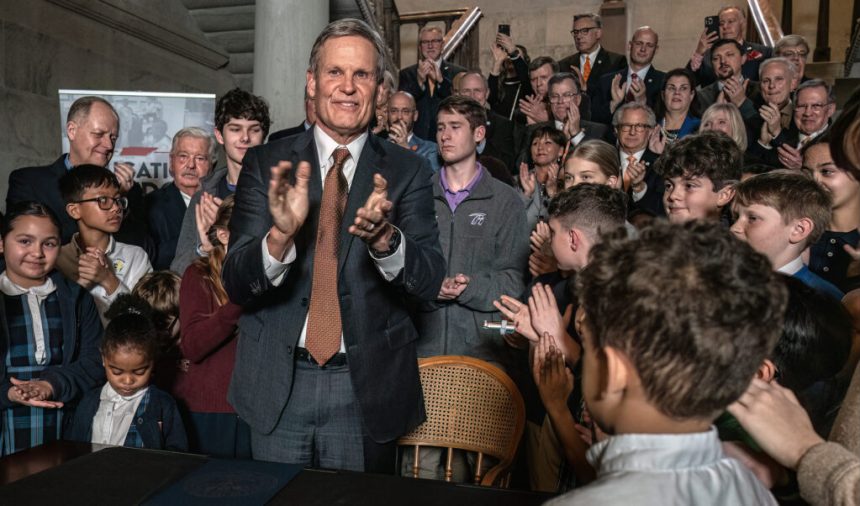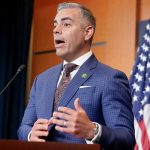Gov. Bill Lee applauds after signing a universal school voucher measure into law on Feb. 12, 2025. (Photo: John Partipilo/Tennessee Lookout)
A Shelby County lawmaker who voted in favor of the governor’s education voucher program is questioning the state’s refusal to disclose the number of private-school students using the funds.
“I don’t understand why it’s not available … because it’s my understanding that the private schools do communicate with the public school districts whenever they receive transfers from public to private,” said Republican Rep. Kevin Vaughan of Collierville.
A former member of the Collierville School Board, Vaughan voted against the governor’s first plan in 2019 to provide funds for low-income students in Shelby and Davidson counties to spend on private schools. In a special legislative session this year, he voted for the statewide proposal that is providing $7,300 each for 20,000 students to pay for private school costs.
Some 10,000 of the students come from families with no income limit, and the other 10,000 have an income limit at 300% of federal poverty guidelines, about $173,000 for a family of four.
Democratic state Sen. Jeff Yarbro of Nashville called it “absurd” to withhold information on student enrollment for a new “entitlement” program that drew interest from about 100,000 students already enrolled in private schools.
Rep. Kevin Vaughan, a Collierville Republican, is questioning why the Tennessee Department of Education has refused to disclose how many existing private school students are using state-funded school vouchers. (Photo: John Partipilo/Tennessee Lookout)
“It just means we have no idea how this program works or whether it’s effective,” Yarbro said. “Simply getting one out of five of those families to accept an additional $7,000 in their lives is not anything to brag about.”
Several lawmakers who voted for the bill early this year said they wanted the money to go to low-income, single women to help take their children out of a “failing” school.
Vaughan couched his statement somewhat, saying his constituents who are using the new voucher program “all seem very happy with it.” He wasn’t certain whether those were public school transfers.
The Tennessee Department of Education, which said previously it is not required to release a breakdown on private-school students receiving the money, sent out a statement last week announcing “remarkable results” in the program’s first year.
The release said all 20,000 available seats for the program are “reserved,” after the state received 42,000 applications. It also said students from 86 of the state’s 95 counties received the funds, and that 220 of 241 eligible schools statewide enrolled students.
An Education Department spokesperson did not respond Monday to numerous email questions from the Lookout.
A financial analysis on the bill that passed this year estimated that 66% of the students would be enrolled in private schools already, leading critics of the legislation to call the program a private-school subsidy.
The Department of Education said it reviewed applications in the order they were received, and Education Commissioner Lizzette Reynolds lauded the launch, saying she’s “thrilled with the success and demand demonstrated in the first year.”
Prior enrollment in a public school isn’t required under the new program as it was with the Education Savings Account program enacted in 2019. But rules for the new private-school voucher program and state Board of Education include a provision specifying priorities for applicants after the first year in case the number of applications exceeds the number of vouchers available.
The department is to revise the application process to meet those requirements, a Department of Education spokesperson told the Lookout in June.
It just means we have no idea how this program works or whether it’s effective. Simply getting one out of five of those families to accept an additional $7,000 in their lives is not anything to brag about.
– Sen. Jeff Yarbro, D-Nashville
Legislative Democrats, nearly all of whom opposed the private-school voucher bill, are raising questions about its rollout.
Democrats say they aren’t surprised the state withheld a breakdown on the number of vouchers going to private-school students and those at upper-income levels.
Similarly, they say the state is likely holding back information on enrollment by county because it could show the money is going mainly to the state’s wealthiest counties.
“Fifty percent of the benefit of this program goes to the top 5% of families by income,” Yarbro said. “It’s hard to think of any other program Tennessee has rolled out where that’s the case.”
The program’s total cost is projected to be $1.1 billion in its first year: $146 million for vouchers; $198 million for $2,000 teacher bonuses; $3.3 million to pay districts that lose students; and $2.7 million for administration.
Yarbro believes the cost of the voucher program will increase dramatically because students receiving the funding will need it annually to pay for tuition, as more students apply for the money.
SUBSCRIBE: GET THE MORNING HEADLINES DELIVERED TO YOUR INBOX









